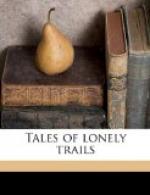In the afternoon we reached Lake Mary, a long, ugly, muddy pond in a valley between pine-slopes. Dead and ghastly trees stood in the water, and the shores were cattle-tracked. Probably to the ranchers this mud-hole was a pleasing picture, but to me, who loved the beauty of the desert before its productiveness, it was hideous. When we passed Lake Mary, and farther on the last of the cut-over timber-land, we began to get into wonderful country. We traveled about sixteen miles, rather a small day’s ride. Romer stayed on his horse all through that ride, and when we selected a camp site for the night he said to me: “Well, you’re lucky you wouldn’t bet.”
Camp that evening was in a valley with stately pines straggling down to the level. On the other slope the pines came down in groups. The rim of this opposite slope was high, rugged, iron-colored, with cracks and holes. Before supper I walked up the slope back of our camp, to come upon level, rocky ground for a mile, then pines again leading to a low, green mountain with lighter patches of aspen. The level, open strip was gray in color. Arizona color and Arizona country! Gray of sage, rocks, pines, cedars, pinons, heights and depths and plains, wild and open and lonely—that was Arizona.
That night I obtained some rest and sleep, lying awake only a few hours, during which time I turned from side to side to find a soft place in the hard bed. Under such circumstances I always thought of the hard beds of the Greeks and the Spartans. Next day we rode twenty-three miles. On horseback trips like this it was every one for himself. Sometimes we would be spread out, all separated; at others we would be bunched; and again we would ride in couples. The morning was an ordeal for me, as at first I could scarcely sit my saddle; in the afternoon, however, riding grew to be less severe. The road led through a winding, shallow valley, with clumps of pine here and there, and cedars on the slopes. Romer rode all the way, half the time with his feet out of the stirrups, like a western boy born to the saddle, and he wanted to go fast all the time. Camp was made at a place called Fulton Spring. It might have been a spring once, but now it was a mud-hole with a dead cow lying in it. Clear, cold water is necessary to my pleasure, if not to my health. I have lived on sheep water—the water holes being tainted by sheep—and alkali water and soapy water of the desert, but never happily. How I hailed the clear, cold, swiftly-flowing springs!
This third camp lay in a woods where the pines were beautiful and the silence noticeable. Upon asking Romer to enumerate the things I had called to his attention, the few times I could catch up with him on the day’s journey, he promptly replied—two big spiders—tarantulas, a hawk, and Mormon Lake. This lake was another snow-melted mud-hole, said to contain fish. I doubted that. Perhaps the little bull-head catfish might survive in such muddy water, but I did not believe bass or perch could.




